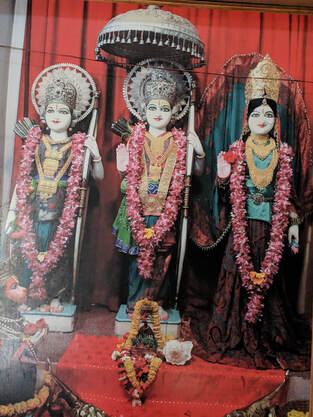|
Dharma, Artha, Kama and Moksha are the purposes of life defined in Hinduism. The Moksha is ultimate destination of life. Various Hindu scriptures, especially Shrimad Bhagavad Gita enlightened the four paths of Moksha or self-realisation or enlightenment viz. the path of wisdom (Jnana yoga), the path of devotion (Bhakti yoga), the path of action (Karma yoga), and the path of meditation (Raja yoga). The prevalence of the different paths has been in four yugas. In Satya-yuga, the path of meditation and Yagas, in Treta-yuga, the path of worship by the rituals and asceticism, in Dvapara-yuga, by following the path of ritual worship as per prescriptions of both the Vedas and tantras and in the Kali-yuga, the paths of Jnana and the Bhakti are predominant. Medieval India saw upsurge of Bhakti movement. Saint Tulsidas (born in Kashi now called as Varanasi, UP, year- 1478-1624 AD), one of proponent of bhakti movement, authored Ram-Charitr-Manas in seven chapters, detailing about life of Maryada Purushottam Bhagwan Shri Rama. In fifth chapter named as Sunder Kanda, he vividly explained about crossing of Indian Ocean by Shri Hanuman, entering into Lanka in search of Ma Sita, the meetings with Sursa, Demoness, Lankani, Vibhishan, Ma Sita, Meghnath & Ravana in Lanka, return to Kishkindha and other accounts about movement of army of Shri Rama near Ocean to cross it. Sunder-Kanda means “beautiful-Chapter”. Sunder- Kanda is so called because it gives a detailed account of a devotee's journey on the path of a virtuous life and spiritual transformation. Shri Hanuman, the devotee is inspired by ‘Jamvant’, who symbolizes intelligence; motivates Hanuman to move ahead in spiritual journey. Sense control is the bridge through which one can cross the ocean of mundane attachments. If a seeker lives with discipline, he will not drown in the ocean of mundane attachments. On the way of spiritual journey, many people and situations create obstacles in the spiritual progress. Both, the paths of Jnana and Bhakti are revealed in the Chanting of Sunder Kanda.
The Sunder-Kanda helps human beings in Kalyug to overcome problems. It has been sung by Tulsidas & anyone who says it, can go through life without pain & difficulty, as Shri Ram is an Ocean of Peace & happiness. (यह चरित कलि मल हर जथामति दास तुलसी गायऊ॥ सुख भवन संसय समन दवन बिषाद रघुपति गुन गना। तजि सकल आस भरोस गावहि सुनहि संतत सठ मना॥ 5/60) The various verses of Sunder-Kanda have exemplified the paths Jnana and Bhakti. These verses are discussed hereunder:
Wisdom (Jnana Yoga):
In Suder-kanda, Shri Hanuman encounters three forms of Prakriti as mentioned below:
Devotion and Devotee (Bhakti & Bhakt): Saint Tulsidas elaborated the devotions of Shri Hanuman who set him as an example of ideal devotee while performing tasks of Shri Rama. Various verses of Sunder-kanda mention the guidelines of the ideal devotion as under:
Hanuman ji tells Vibhishan on meeting him in Lanka that it is Shri Ram’s nature to always love his devotees. Hanuman ji further says, although he is a monkey who is considered to be low in caste & any person who took their name early morning, would not get food the whole day, yet Shri Ram has bestowed his blessings. Anybody who does not realise this & runs after the worldly pleasures will always be unhappy.
When Ma Sita gets worried as to how a monkey could fight the powerful demons. Hanumanji then reveals her his actual form as big & as strong as the golden mountain, & then again transformed himself into his tiny form. Seeing this, Ma Sita feels at peace. He then tells her that a monkey may not have strength but when he has the blessings of Shri Ram even a small snake can kill an eagle.
After returning from Lanka, Shri Hanuman meets Bhagwan Rama who praises him. Then Hanumanji tells him that it is not his glory. It is only your grace. If you are happy with one, nothing is difficult for him. With your influence cotton (which is itself a very quick burning thing) can definitely burn Badanal (i.e., impossible can also be possible).
Shiv ji says to Ma Uma! The person who knows the nature of Shri Ramji, he does not like anything except chanting names of Shri Rama. One, who understands the dialogue of Shri and Hanuman ji (Master and servent), he gets the devotion of the feet of Shri Raghunathji.
Vibhishan ji tells Ravana that desire (including sexual desire), anger, pride and greed take one to hell. Leave them immediately and chant the name Shri Rama whose name is chanted by saints.
Importance of Surrender (Samarpan) Bhagwan Shri Rama has quoted as under:
Those who surrender before him (Shri Rama), they get his love and affection. There are three instances where Shri Rama has showered his love and affection on those who came under his protection as under:
0 Comments
Leave a Reply. |
Archives
April 2020
Categories |

 RSS Feed
RSS Feed